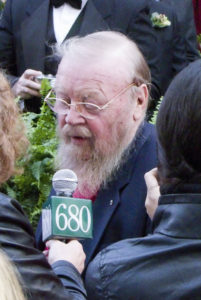We all love wolves today, but that was not the case 50 years ago. Wolves were thought to be ferocious predators that killed for fun as well as food. Among the events that changed our thinking was the 1963 book, Never Cry Wolf, written by Farley Mowat.
Mowat was born in Ontario on May 12, 1921 (died 2014). The family moved often, as his librarian father sought work farther and farther west. Their mode of transport was as unique as their son would become: they traveled in a ship’s cabin attached to a Model T truck frame that they called Rolling Home. They settled in Saskatoon, Saskatchewan, during the Depression. Mowat became a lover of wild nature, even keeping a rattlesnake as a pet. He visited the Arctic with an uncle when he was 15, fueling a lifelong interest in Arctic environments and peoples. He fought in World War 2, including serving behind enemy lines in the Netherlands to coordinate a food drop that saved thousands of lives.
After the war, Mowat’s career as a storytelling author began. In all, he wrote 45 books that have been translated into 52 languages and sold 17 million copies. His books range from whimsical tales about animals for children to hard-hitting exposes of the treatment of Native Peoples in the Arctic. Topics for his work ranged from the life of gorilla biologist Dian Fossey to the exploitation of whales in Newfoundland, to tales of his war experiences to the general slaughter of all animals species.

He considered his work to lie between non-fiction and fiction, stating that he was suspicious of facts because they could be used to distort more fundamental truths. He wrote, “Having eschewed the purely factual approach, I was not willing to go to the other extreme and take the easy way out by writing fiction. My métier lay somewhere in between what was then a grey void between fact and fiction.”
His most famous book is Never Cry Wolf, published in 1963. In 1946, he spent a season as a lone biologist, dropped in the wilderness of northern Manitoba to study the life of wolves. His account portrayed wolves as gentle, loving animals that cared for their young and killed only what they needed to eat. And they often survived on mice (which Womat tried himself and quite liked). He described one adult male wolf as the ideal father: “Conscientious to a fault, thoughtful of others, and affectionate within reasonable bounds, he was the kind of father whose idealized image appears in many wistful books of human family reminiscences.”
His books were either loved or hated. Obviously, most peopled loved his work as he became one of Canada’s most popular authors. But others criticized his casual relationship with the facts, naming him not Farley Mowat, but “Hardly Know-it.” He was once denied entry into the United States, in 1985, because he was considered a subversive.
Nevertheless, his work on many topics—wolves, commercial whaling, treatment of native peoples—helped establish and motivate the modern environmental movement. Elizabeth May, a Canadian environmental politician, noted that Mowat “…was telling stories that made you laugh out loud, but which made you see that the natural world was a big part of who we are.”
References:
Austen, Ian. 2014. Farley Mowat, Author, Dies at 92; a Champion of the Far North. The New York Times, May 7, 2014. Available at: https://www.nytimes.com/2014/05/08/world/americas/farley-mowat-canadian-writer-and-wildlife-advocate-dies-at-92.html. Accessed May 9, 2018.
Historic Canada. Farley Mowat. Available at: http://www.thecanadianencyclopedia.ca/en/article/farley-mowat/. Accessed May 9, 2018.
Parini, Jay. 2014. Farley Mowat obituary. The Guardian, 8 May 2014. Available at: https://www.theguardian.com/environment/2014/may/08/farley-mowat. Accessed May 9, 2018.
